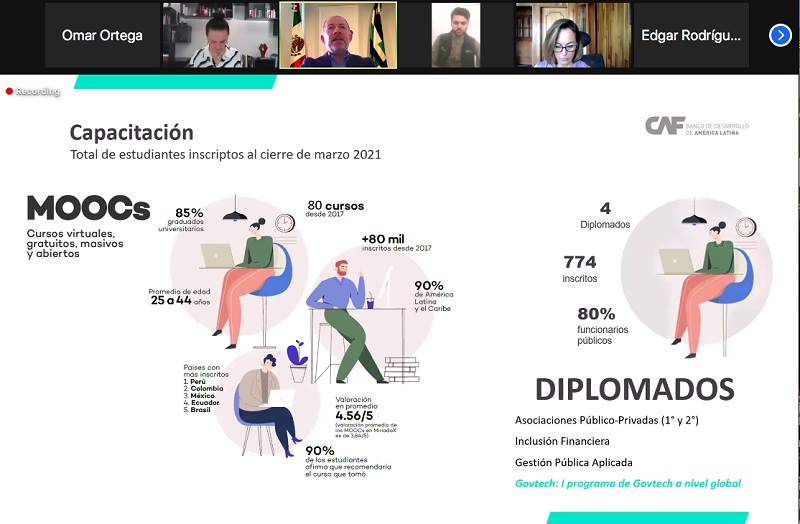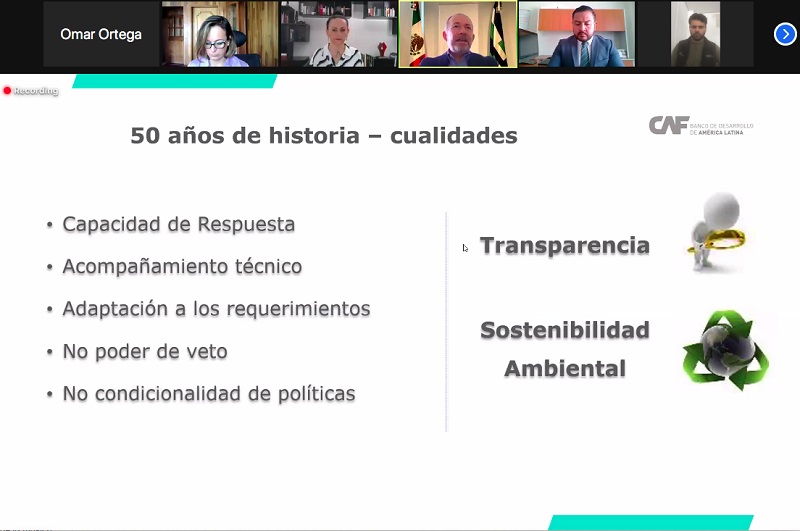CAF shares best sustainable development practices with Mexico State public servants
The representative of CAF—development bank of Latin America—in Mexico, Emilio Uquillas, participated in the forum “Development Practices for Local Governments in the State of Mexico” organized by the Planning Committee for the Development of the State of Mexico (COPLADEM), where he discussed financing alternatives for the sustainable development in the state.
In his speech, the CAF representative addressed topics such as CAF’s strategic vision and evolution, Mexico action plan, and outstanding projects in the country and Latin America.
“It is particularly important for CAF to have the opportunity to share specialized knowledge and lessons learned in the various projects it continuously supports in the region,” Uquillas said. “Bringing these kinds of experiences to local public servants and representatives from different sectors of society is paramount to building their technical capacities and their competence to work for the sustainable development of their state,” he added.
In these meetings, CAF promotes best practices in the Latin American context in an effort to reduce productivity gaps with respect to high-income countries. The institution has defined five strategic areas to be addressed in the region, namely efficiency, equity, sustainability, institutional strength and integration. In addition, CAF has approved more than USD 7 billion as part of its commitment to address the impact of COVID-19 on the region.
This forum was intended for state and municipal public servants, civil society organizations, entrepreneurs, among others. Its purpose was to publicize development practices for local governments by experts and specialists. As a result, the Mexico State government made CAF another national and international strategic alliance with technical and meteorological tools that enable them to achieve the sustainable development goals of the 2030 Agenda.
In addition to Emilio Uquillas, the forum featured experts in different areas of development, who work in the public, and private sectors, academia and organized civil society, including José Arturo Lozano Enríquez, Undersecretary of Revenue of the Ministry of Finance of the Government of the State of Mexico and Jorge Mendoza Sánchez, Director General of Banobras.
Other topics discussed in the panels included: Collaborative work, innovation and social entrepreneurship; Transparency, open government and use of ICTs; Telework and digital ecosystems in public management.
This type of events seeks to build institutional capacities of state and municipal public servants, which is key to encouraging citizen participation and promoting multi-stakeholder public policies that accelerate the development of the state.
CAF's more recent content

CAF, ECLAC, IDB and PAHO Promote Sustainable Development in the G20
The Regional Organizations of the Americas congratulate Brazil on its successful G20 Presidency, highlighting its leadership on key issues such as poverty, governance, and climate change. They also reaffirm their commitment to actions that promote equity and development in the region.
Urgent Call for Action to Safeguard Caribbean SIDS at CAF Symposium
As the global community grapples with the escalating climate crisis, Caribbean Small Island Developing States (SIDS) are running out of time to secure critical investments and support needed to strengthen their economies and protect vulnerable communities from the intensifying impacts of climate change. With the window to take decisive action rapidly shrinking, CAF - Development Bank of Latin America and the Caribbean, in partnership with the Commonwealth Secretariat and the Antigua and Barbuda High Commission, brought together key stakeholders for a symposium in London to address the critical vulnerabilities Caribbean SIDS face.

